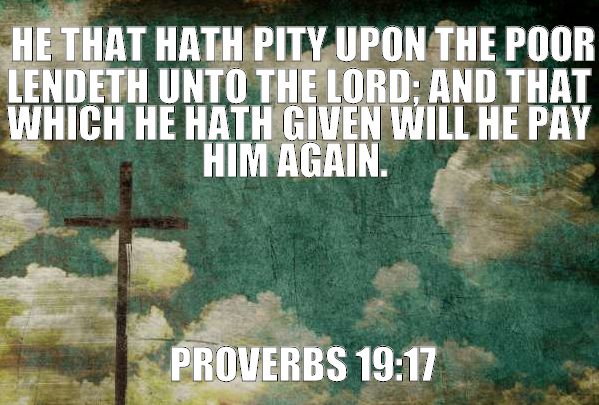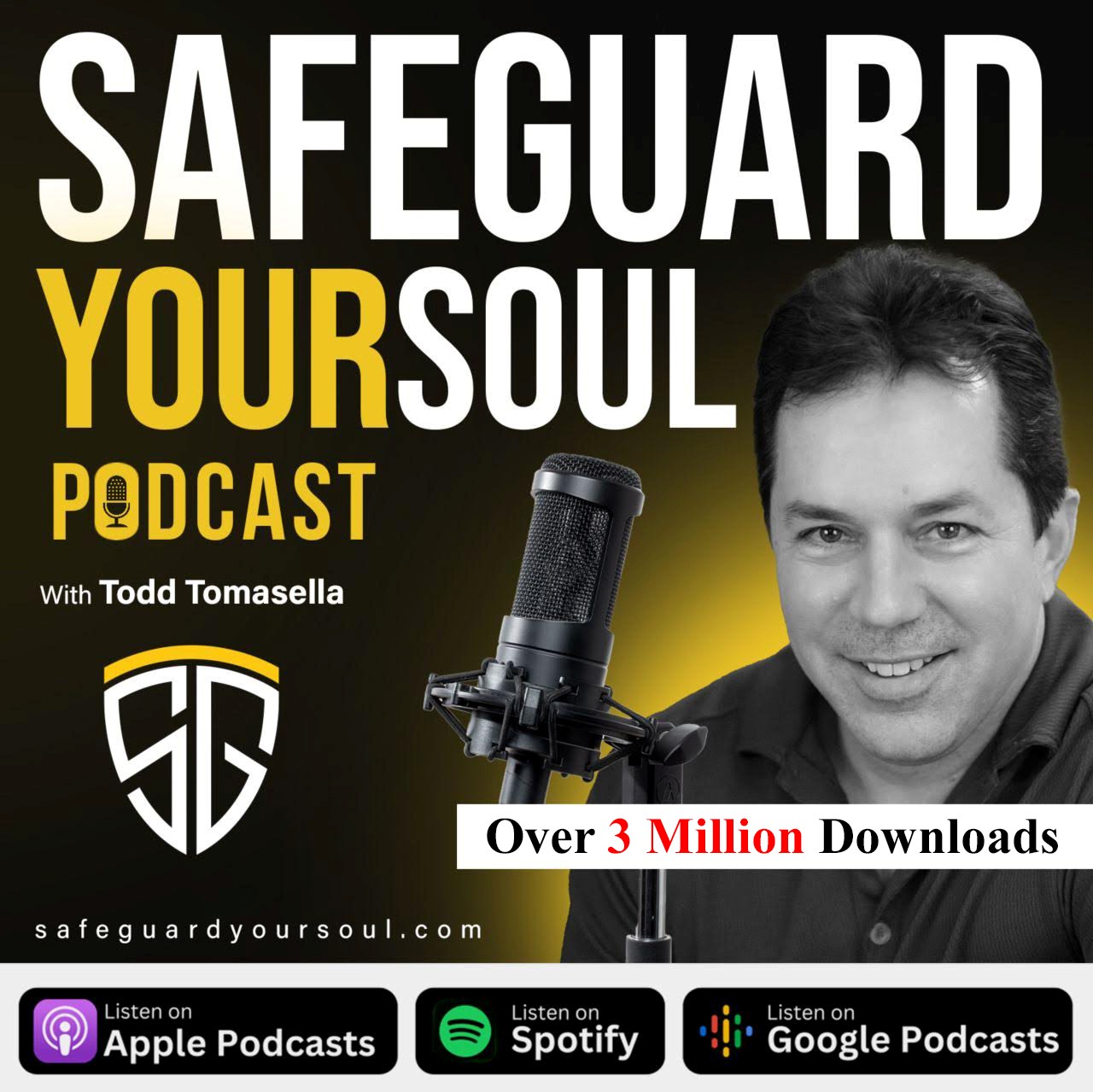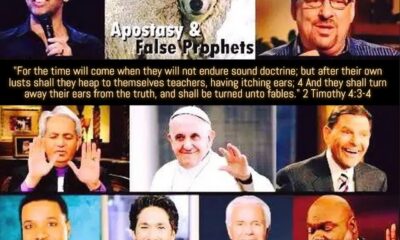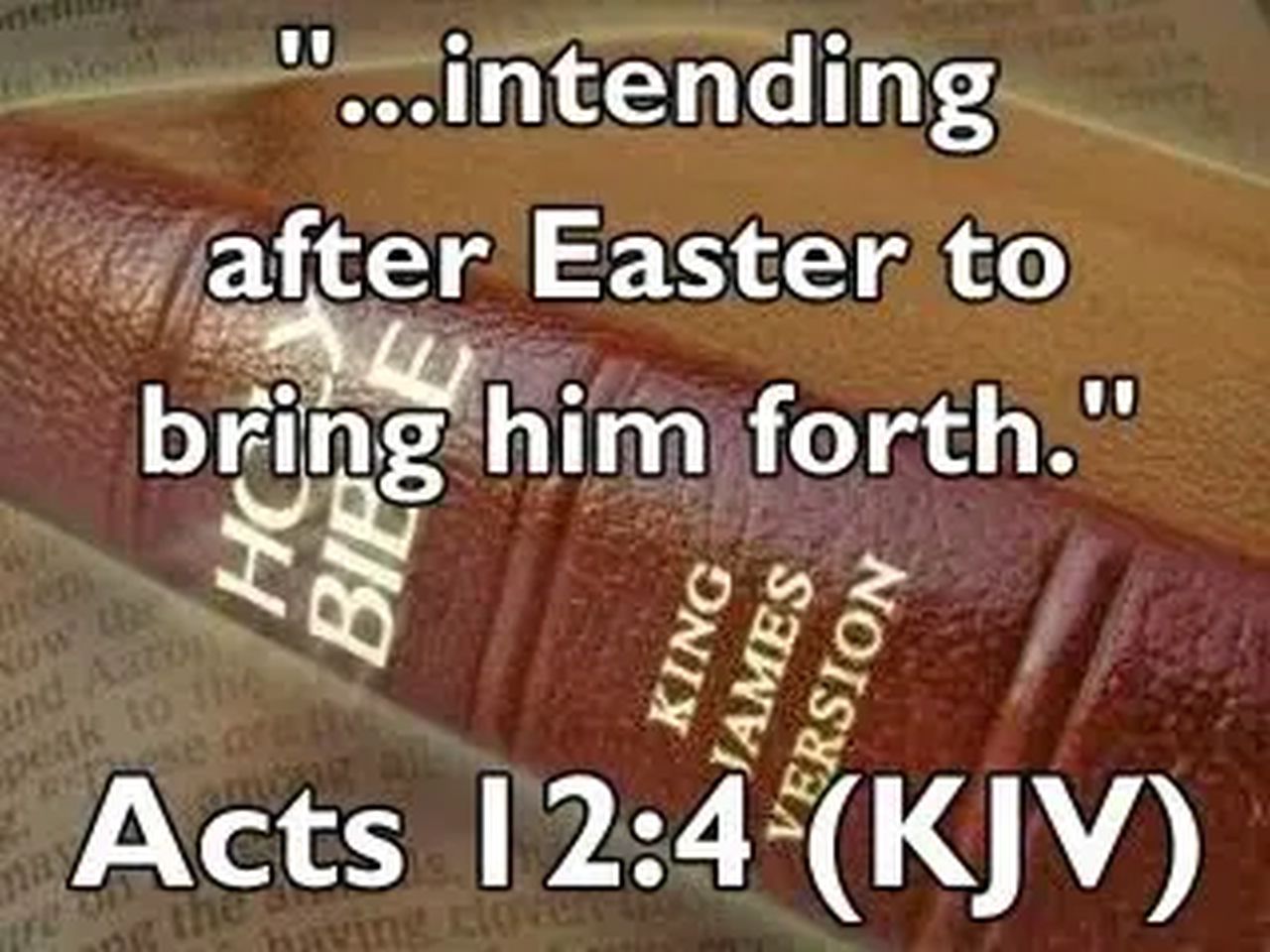
Was “Easter” a Mistranslation in the King James Bible? Acts 12:4 [video]
Luke the physician’s style of writing included things that were indicators yet not sanctioned by the LORD in the worship of God. For example:
“And after three months we departed in a ship of Alexandria, which had wintered in the isle, whose sign was Castor and Pollux.” Acts 28:11
Of this use of the “sign” of “Castor and Pollux,” the Believer’s Bible Commentary notes the following:
“28:11 The figurehead of this ship was the Twin Brothers, that is, Castor and Pollux. These were supposed, by heathen sailors, to be the patron gods of mariners.”
This is clear proof that everything in Scripture is not necessarily sanctioned from God as part of worshipping Him but is rather frank talk in mentioning the facts being communicated and timeline.
Just because the Bible uses the word “Easter” does not mean 1. It’s a bad translation, or 2. that it was sanctioned in the worship of God. In relating this event, Luke used the word “Easter” to mark a certain event, tradition, time. Notice the phrase “after Easter” which simply referred to a time, after a certain day designated by the heathen in their pagan worship. This in no way indicates that it has anything to do in honoring, worshiping the LORD. Nor does this mean it was the wrong word to use in this text by the translators.
We use this same principle in our own communications today. If someone were to ask another person when they thought they’d be finished building their new home, the builder may say something like: Some time after July 4th. Is July 4th a celebration by Christians to worship God? No. Yet we wouldn’t think twice about using it to mark a designated weekend in our calendar year, right? Right.
When you read the text, it becomes apparent it’s a narrative of Herod using the pagan calendar, and not something giving reverence to this pagan holiday. The passage is describing HEROD’s timeline to kill Peter, and not giving reverence to paganism. It’s simply narrating from Herod’s perspective.
“Now about that time HEROD the king stretched forth his hands to vex certain of the church. … 4 And when he had apprehended him, he put him in prison, and delivered him to four quaternions of soldiers to keep him; intending after Easter to bring him forth to the people.” Acts 12:1,4
Defenders of fake “bibles” love to try to use this one to discount God’s preserved Word and justify their use of satan’s counterfeits, satan’s attack “bibles” against the LORD they claim to serve. Not.
The “Easter” Question Cleared Up Conclusively
As usual the King James Bible got it correct-because it is God’s Word.
Samuel C. Gipp.
QUESTION: Isn’t “Easter” in Acts 12:4 a mistranslation of the word “pascha” and should it be translated as “passover”?
ANSWER: No, “pascha” is properly translated “Easter” in Acts 12:4 as the following explanation will show.
EXPLANATION: The Greek word which is translated “Easter” in Acts 12:4 is the word “pascha.” This word appears twenty-nine times in the New Testament. Twenty-eight of those times the word is rendered “Passover” in reference to the night when the Lord passed over Egypt and killed all the firstborn of Egypt (Exodus 12:12), thus setting Israel free from four hundred years of bondage.
The many opponents to the concept of having a perfect Bible have made much of this translation of “pascha.”
Coming to the word “Easter” in God’s Authorized Bible, they seize upon it imagining that they have found proof that the Bible is not perfect. Fortunately for lovers of the word of God, they are wrong. Easter, as we know it, comes from the ancient pagan festival of Astarte. Also known as Ishtar (pronounced “Easter”). This festival has always been held late in the month of April. It was, in its original form, a celebration of the earth “regenerating” itself after the winter season. The festival involved a celebration of reproduction. For this reason the common symbols of Easter festivities were the rabbit (the same symbol as “Playboy” magazine), and the egg. Both are known for their reproductive abilities. At the center of attention was Astarte, the female deity. She is known in the Bible as the “queen of heaven” (Jeremiah 7:18; 44:17-25). She is the mother of Tammuz (Ezekiel 8:14) who was also her husband! These perverted rituals would take place at sunrise on Easter morning (Ezekiel 8:13-16). From the references in Jeremiah and Ezekiel, we can see that the true Easter has never had any association with Jesus Christ.
Problem: Even though the Jewish Passover was held in mid April (the fourteenth) and the pagan festival Easter was held later the same month, how do we know that Herod was referring to Easter in Acts 12:4 and not the Jewish Passover? If he was referring to the Passover, the translation of “pascha” as “Easter” is incorrect. If he was indeed referring to the pagan holyday (holiday) Easter, then the King James Bible (1611) must truly be the very word and words of God for it is the only Bible in print today which has the correct reading.
To unravel the confusion concerning “Easter” in verse 4, we must consult our FINAL authority, THE BIBLE. The key which unlocks the puzzle is found not in verse 4, but in verse 3. (Then were the days of unleavened bread… “) To secure the answer that we seek, we must find the relationship of the Passover to the days of unleavened bread. We must keep in mind that Peter was arrested during the “days of unleavened bread” (Acts 12:3).
Our investigation will need to start at the first Passover. This was the night in which the LORD smote all the firstborn in Egypt. The Israelites were instructed to kill a lamb and strike its blood on the two side posts and the upper door post (Exodus 12:4,5). Let us now see what the Bible says concerning the first Passover, and the days of unleavened bread.
Exodus 12:13-18: “And the blood shall be to you for a token upon the houses where ye are: and when I see the blood, I will pass over you, and the plague shall not be upon you to destroy you, when I smite the land of Egypt.
14 And this day shall be unto you for a memorial; and ye shall keep it a feast to the LORD throughout your generations; ye shall keep it a feast by an ordinance for ever.
15 Seven days shall ye eat unleavened bread; even the first day ye shall put away leaven out of your houses: for whosoever eateth leavened bread from the first day until the seventh day, that soul shall be cut off from Israel.
16 And in the first day there shall be an holy convocation to you; no manner of work shall be done in them, save that which every man must eat, that only may be done of you.
17 And ye shall observe the feast of unleavened bread; for in this selfsame day have I brought your armies out of the land of Egypt: therefore shall ye observe this day in your generations by an ordinance for ever.
18 In the first month, on the fourteenth day of the month at even ye shall eat unleavened bread, until the one and twentieth day of the month at even.”
Here in Exodus 12:13 we see how the Passover got its name. The LORD said that He would “pass over” all of the houses which had the blood of the lamb marking the door.
After the Passover (Exodus 12:13,14), we find that seven days shall be fulfilled in which the Jews were to eat unleavened bread. These are the days of unleavened bread!
In verse 18 we see that dates for the observance were April 14th through the 21st.
This religious observance is stated more clearly in Numbers 28:16-18: “And in the fourteenth day of the first month is the passover of the LORD.
17 And in the fifteenth day of this month is the feast: seven days shall unleavened bread be eaten.
18 In the first day shall be an holy convocation; ye shall do no manner of servile work therein:”
In verse 16 we see that the Passover is only considered to be the 14th of the month. On the next morning, the 15th begins the “days of unleavened bread.”
Here in Deuteronomy we see again that the Passover is sacrificed on the first night (Deuteronomy 16:1). It is worth noting that the Passover was to be celebrated in the evening (vs.6) not at sunrise (Ezekiel 8:13-16).
In II Chronicles 8:13 we see that the feast of unleavened bread was one of the three Jewish feasts to be kept during the year.
II Chronicles 8:13: “Even after a certain rate every day, offering according to the commandment of Moses, on the sabbaths, and on the new moons, and on the solemn feasts, three times in the year, even in the feast of unleavened bread, and in the feast of weeks, and in the feast of tabernacles.”
Whenever the Passover was kept, it always preceded the feast of unleavened bread. In II Chronicles 30 some Jews who were unable to keep the Passover in the first month were allowed to keep it in the second. But the dates remained the same.
II Chronicles 30:l5,21: “Then they killed the passover on the fourteenth day of the second month: and the priests and the Levites were ashamed, and sanctified themselves, and brought in the burnt offerings into the house of the LORD. And the children of lsrael that were present at Jerusalem kept the feast of unleavened bread seven days with great gladness: and the Levites and the priests praised the LORD day by day, singing with loud instruments unto the LORD.”
Ezra 6:19,22: “And the children of the captivity kept the passover upon the fourteenth day of the first month. And kept the feast of unleavened bread seven days with joy: for the LORD had made them joyful, and turned the heart of the king of Assyria unto them, to strengthen their hands in the work of the house of God, the God of Israel.”
We see then, from studying what the BIBLE has to say concerning the subject that the order of events went as follows:
(1) On the 14th of April the lamb was killed. This is the Passover. No event following the 14th is ever referred to as the Passover.
(2) On the morning of the 15th begins the days of unleavened bread, also known as the feast of unleavened bread.
It must also be noted that whenever the Passover is mentioned in the New Testament, the reference is always to the meal, to be eaten on the night of April 14th not the entire week. The days of unleavened bread are NEVER referred to as the Passover. (It must be remembered that the angel of the Lord passed over Egypt on one night, not seven nights in a row.
Now let us look at Acts 12:3,4: “And because he saw it pleased the Jews, he proceeded further to take Peter also. (Then were the days of unleavened bread.) And when he had apprehended him, he put him in prison, and delivered him to four quaternions of soldiers to keep him; intending after Easter to bring him forth to the people.”
Verse 3 shows that Peter was arrested during the days of unleavened bread (April 15-2 1). The Bible says: “Then were the days of unleavened bread.” The Passover (April 14th) had already come and gone. Herod could not possibly have been referring to the Passover in his statement concerning Easter. The next Passover was a year away! But the pagan holiday of Easter was just a few days away. Remember! Herod was a pagan Roman who worshiped the “queen of heaven.” He was NOT a Jew. He had no reason to keep the Jewish Passover. Some might argue that he wanted to wait until after the Passover for fear of upsetting the Jews. There are two grievous faults in this line of thinking.
First, Peter was no longer considered a Jew. He had repudiated Judaism. The Jews would have no reason to be upset by Herod’s actions.
Second, he could not have been waiting until after the Passover because he thought the Jews would not kill a man during a religious holiday. They had killed Jesus during Passover (Matthew 26:17-19,47). They were also excited about Herod’s murder of James. Anyone knows that a mob possesses the courage to do violent acts during religious festivities, not after.
In further considering Herod’s position as a Roman, we must remember that the Herods were well known for celebrating (Matthew 14:6-11). In fact, in Matthew chapter 14 we see that a Herod was even willing to kill a man of God during one of his celebrations.
It is elementary to see that Herod, in Acts 12, had arrested Peter during the days of unleavened bread, after the passover. The days of unleavened bread would end on the 21st of April. Shortly after that would come Herod’s celebration of pagan Easter. Herod had not killed Peter during the days of unleavened bread simply because he wanted to wait until Easter. Since it is plain that both the Jews (Matthew 26:17- 47) and the Romans (Matthew 14:6-11) would kill during a religious celebration, Herod’s opinion seemed that he was not going to let the Jews “have all the fun.” He would wait until his own pagan festival and see to it that Peter died in the excitement.
Thus we see that it was God’s providence which had the Spirit-filled translators of our Bible (King James) to CORRECTLY translate “pascha” as “Easter.” It most certainly did not refer to the Jewish Passover. In fact, to change it to “Passover” would confuse the reader and make the truth of the situation unclear.
Bible Version Issue | Arrogant Bible Correctors Rebuked
Support | STORE | Podcasts | Jail/Prison Ministry | Mexico Mission here | H.O.T. Bible Study [podcast] | Church History Exposed | Bible Agnostics Exposed | How to Spot a Fake Bible [podcast] | WHAT ABOUT PEOPLE WHO CAN’T UNDERSTAND THE KJB? [podcast] | New American Standard Version “Bible” NASV Catastrophe Exposed | The Audacity of Defending the New Versions | Do We Have God’s Word or Do You Need to Know the Original Languages? [podcast] | Bible Versions Category |
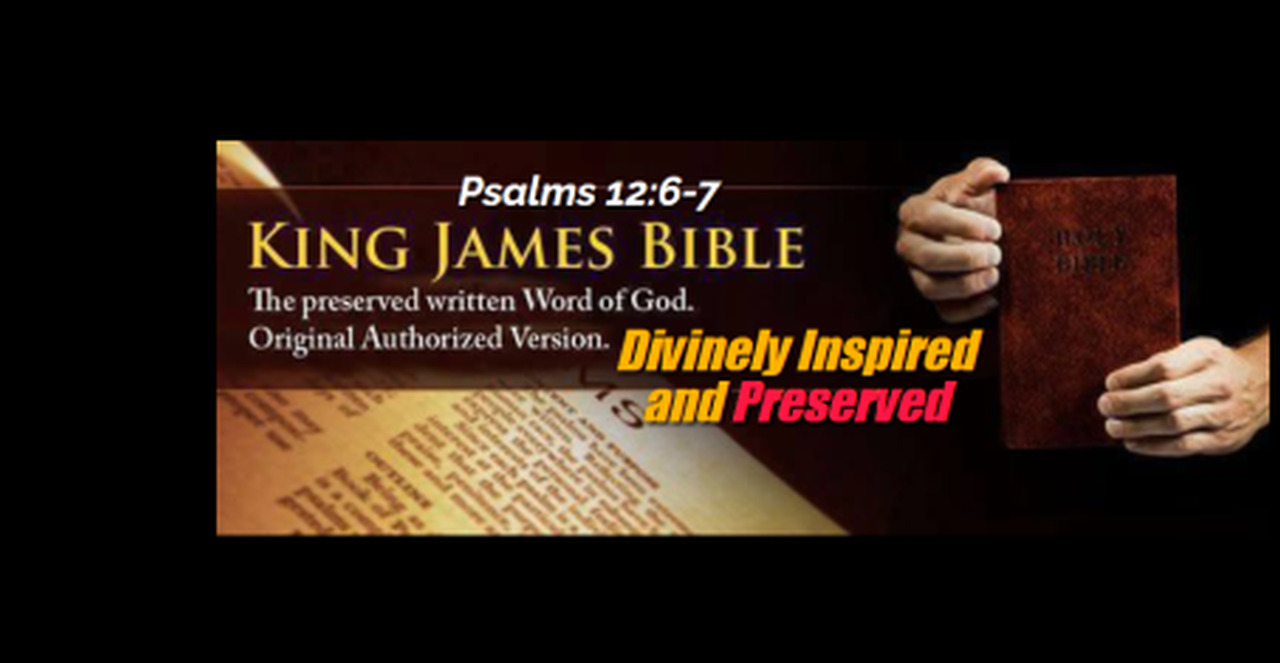

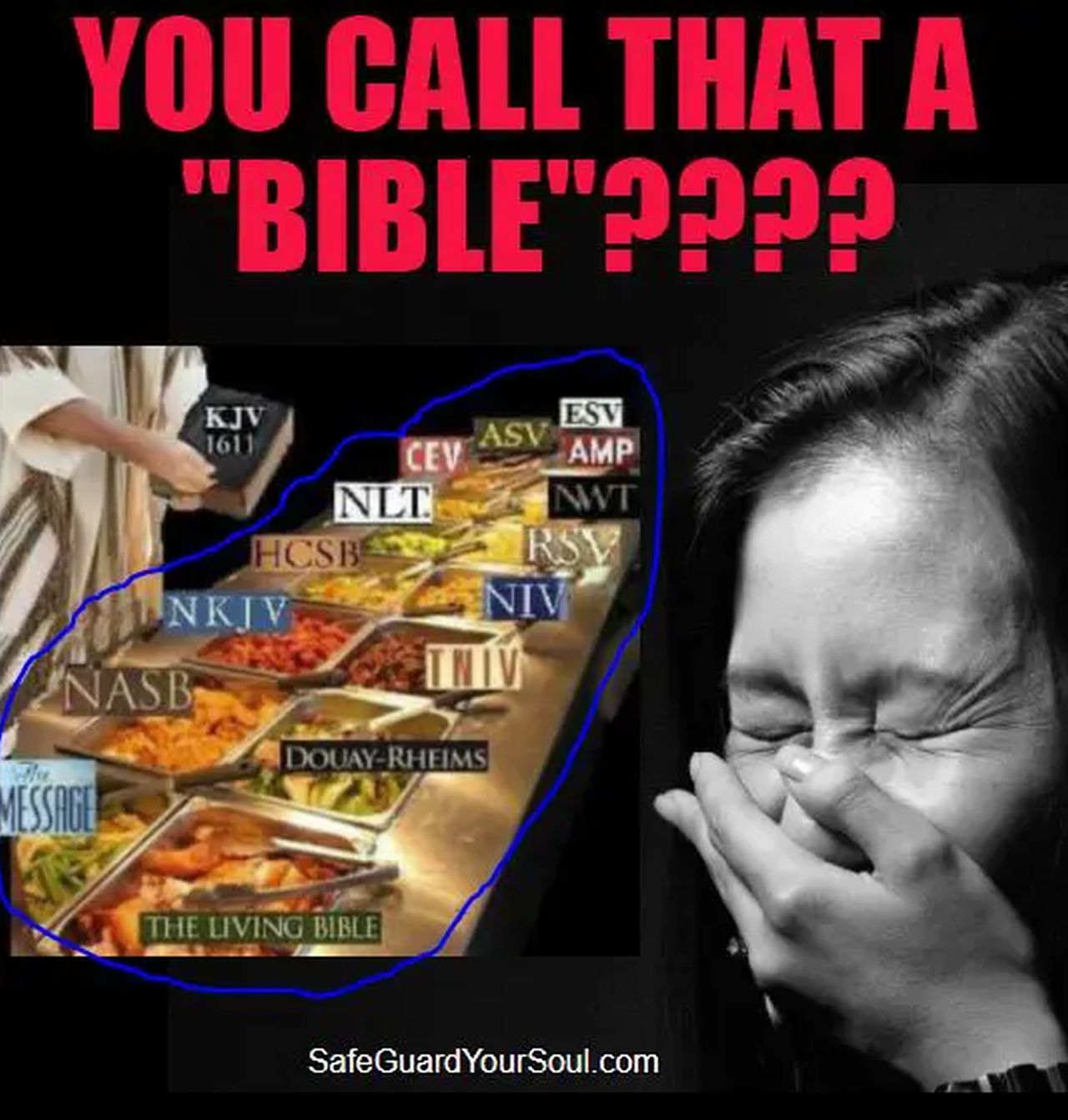
Articles
Rich in Faith [podcast]
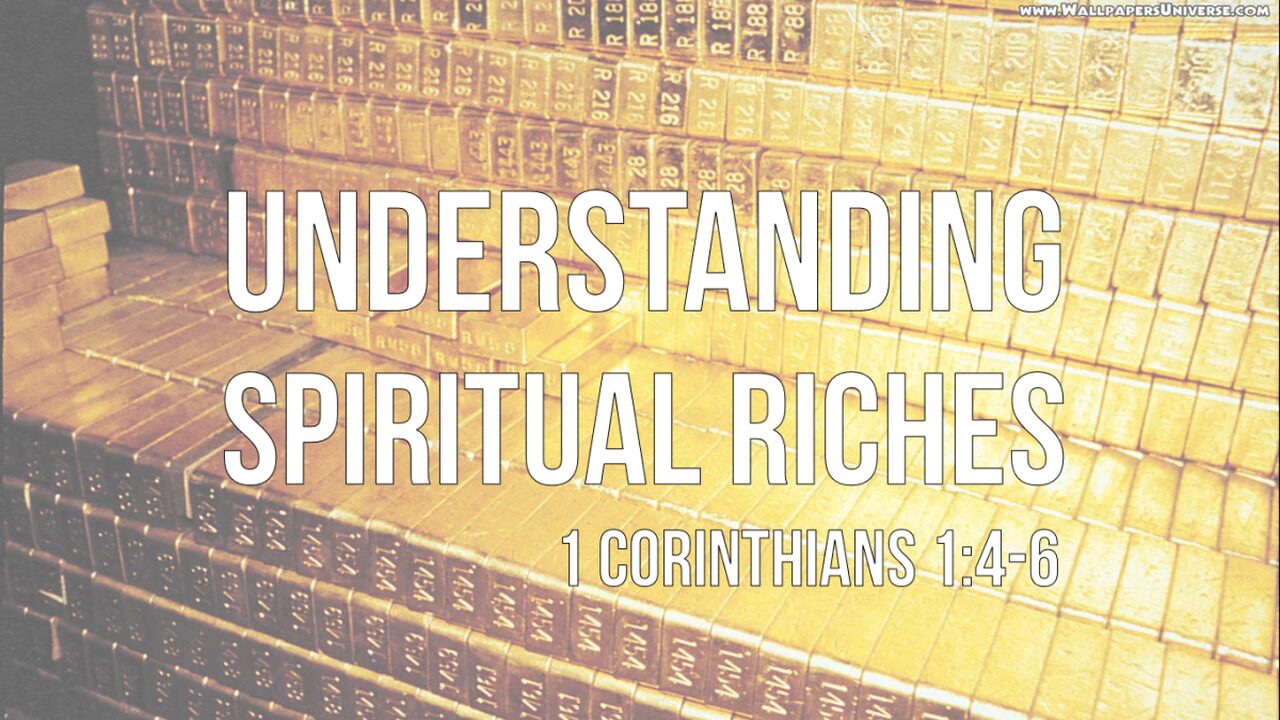
“Them that Love Him”
——WHAT one temporarily has in this fleeting world or doesn’t have, has NOTHING to do with that person’s spiritual state. This is what Jesus taught: “Take heed, and beware of covetousness: for a man’s life consisteth not in the abundance of the things which he possesseth.” (Luke 12:15) In fact James says:
“HEARKEN, MY BELOVED BRETHREN, HATH NOT GOD CHOSEN THE POOR OF THIS WORLD RICH IN FAITH, AND HEIRS OF THE KINGDOM WHICH HE HATH PROMISED TO THEM THAT LOVE HIM?” JAMES 2:5
James says God chooses those for His eternal kingdom “that love him,” namely “the poor of this world.” We are justified by “faith” and not by what we do or do not temporarily possess in this fleeting life.
IF in your mind you rate people by what they have or don’t have in this fleeting sinful world, you are deeply deceived and in utter need of repentance and the washing of water by the Word of God. You are carnally minded (Romans 8:5-6).
Regrettably, it seems that most people professing to be following Christ, the One who gave all, are not the least bit concerned if their brother or sister has a need. God have mercy upon us and grant us repentance in Jesus’ Name! Are these people truly saved?
“Hereby perceive we the love of God, because he laid down his life for us: and we ought to lay down our lives for the brethren. 17 But whoso hath this world’s good, and seeth his brother have need, and shutteth up his bowels of compassion from him, how dwelleth the love of God in him? 18 My little children, let us not love in word, neither in tongue; but in deed and in truth. 19 And hereby we know that we are of the truth, and shall assure our hearts before him.” 1 John 3:16-19
“If we are in Jesus we have the unsearchable riches of Christ (Ephesians 3:8). Unfathomable (in our small minds), infinite wealth and spiritual blessings! Endless mercy, grace, and forgiveness. That is inexhaustible! Why do we need any worldly riches that will rot and corrupt our hearts!? Lay up in your hearts God’s riches! Which are eternal!” Karen Cochran
Some have tens of thousands in the bank and could care less to find out if a sister or brother has a need. The Bible assures us that they are not saved. If you have even a little to give and don’t, it’s because you simply have chosen not to know and abide in Christ.
“What doth it profit, my brethren, though a man say he hath faith, and have not works? can faith save him? 15 If a brother or sister be naked, and destitute of daily food, 16 And one of you say unto them, Depart in peace, be ye warmed and filled; notwithstanding ye give them not those things which are needful to the body; what doth it profit? 17 Even so faith, if it hath not works, is dead, being alone.” James 2:14-17
The financial institutions and their salesmen are vying for your money. They want your money to invest so that you and they earn a financial gain in this life. Christians in need, orphans, and Gospel workers are also available to invest in. To help them is to invest in the LORD’s kingdom and be repaid dividends for eternity. Oh, and your heart will follow where you choose to place your money. Jesus says “Lay not up for yourselves treasures upon earth, where moth and rust doth corrupt, and where thieves break through and steal: 20 But lay up for yourselves treasures in heaven, where neither moth nor rust doth corrupt, and where thieves do not break through nor steal: 21 For where your treasure is, there will your heart be also.” (Matthew 6:19-21)
PRAYER: Holy Father, please break me and make me Your authentic follower. Jesus I love You. Let me walk as You walked, live as You lived, love as You love. Bless this life You gave to be truly crucified with You – dead, buried, and raised up – a vessel of honor for Your glory! In Jesus’ name.
Let’s Grow Together! Sign up here to begin receiving the Moments with Our Master email devotional that is sure to help you grow in His grace and in the knowledge of our LORD and Savior Jesus Christ (2 Pet. 1:2; 3:18). It’s sent out for the edification of the body of Christ. Sign Up HERE.
Support | STORE | Podcasts | Jail/Prison Ministry | Mexico Mission here | All Ministry Updates | More on Assurance here | Because You Care Page | The Greatest of these is Charity | Be Ready in the Morning [podcast] | The Sure Mercies of David [podcast] | That Repentance and Remission of Sins should be Preached [podcast] | At His Feet | Knowing God | The Cross Life | 100’s of Christ-centered Scripture-rich Podcasts | Christology = the Study of Christ
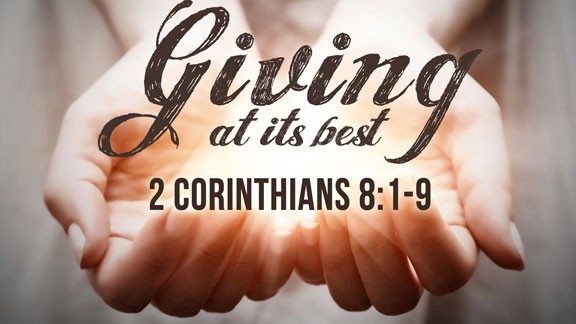

Abiding
Safety in Wise Counsel [podcast]
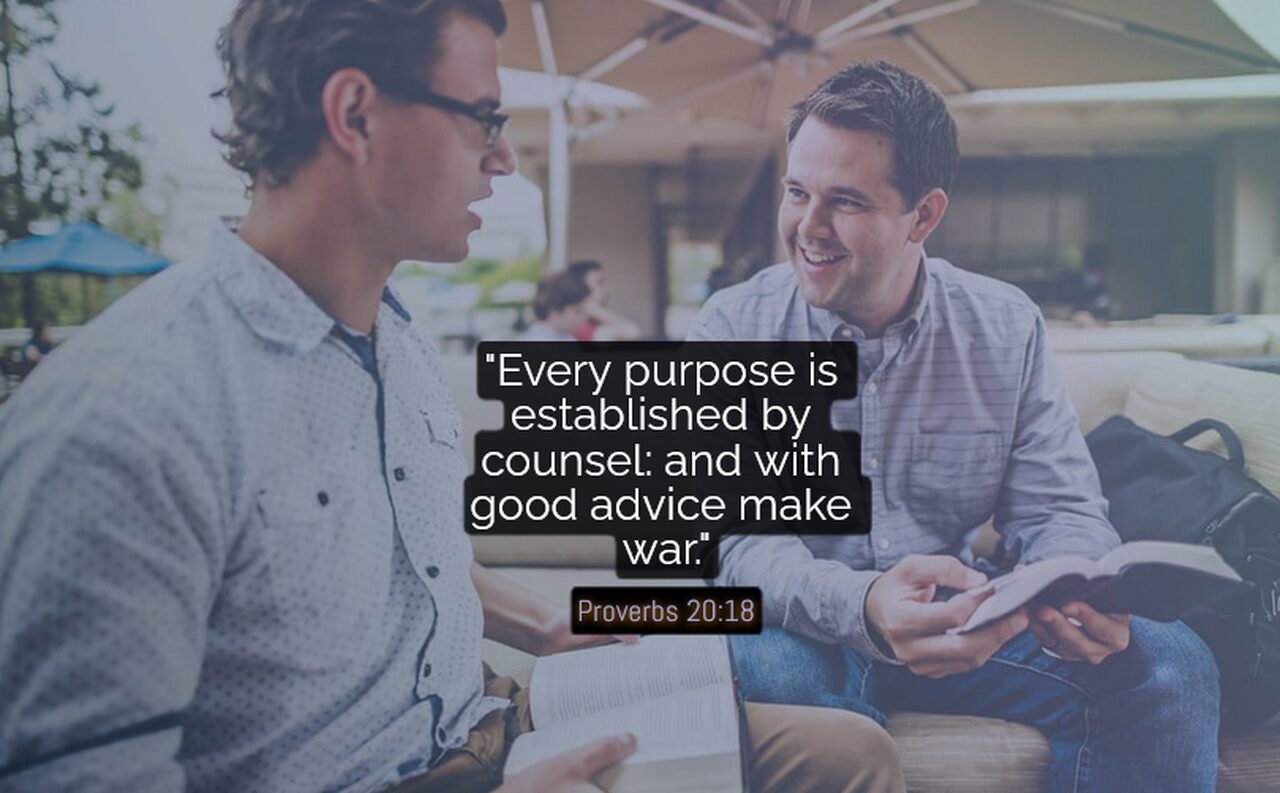
“Every purpose is established by counsel: and with good advice make war.” Proverbs 20:18
“The steps of a good man are ordered by the Lord: and he delighteth in his way.” Psalms 37:23
“So teach us to number our days, that we may apply our hearts unto wisdom.” Psalms 90:12
“Safety” in wise counsel from God’s wisdom, Word, and including at times with the help of His beloved saints.
“Where no counsel is, the people fall: but in the multitude of counsellors there is safety.” Proverbs 11:14
“The horse is prepared against the day of battle: but safety is of the LORD.” Proverbs 21:31
“For by wise counsel thou shalt make thy war: and in multitude of counsellors there is safety.” Proverbs 24:6
Caprice means a sudden and unaccountable change of mood or behavior.
“Who is a wise man and endued with knowledge among you? let him shew out of a good conversation his works with meekness of wisdom. 14 But if ye have bitter envying and strife in your hearts, glory not, and lie not against the truth. 15 This wisdom descendeth not from above, but is earthly, sensual, devilish. 16 For where envying and strife is, there is confusion and every evil work. 17 But the wisdom that is from above is first pure, then peaceable, gentle, and easy to be intreated, full of mercy and good fruits, without partiality, and without hypocrisy. 18 And the fruit of righteousness is sown in peace of them that make peace.” James 3:13-18
Support | STORE | Podcasts | Jail/Prison Ministry | Mexico Mission here | All Ministry Updates | 100’s of Christ-centered Podcasts | Bible Books Narrated | Bible Study Helps | The Book of James Narrated [podcast] | The Book of Revelation Narrated [podcast] | Colossians Overview [podcast]

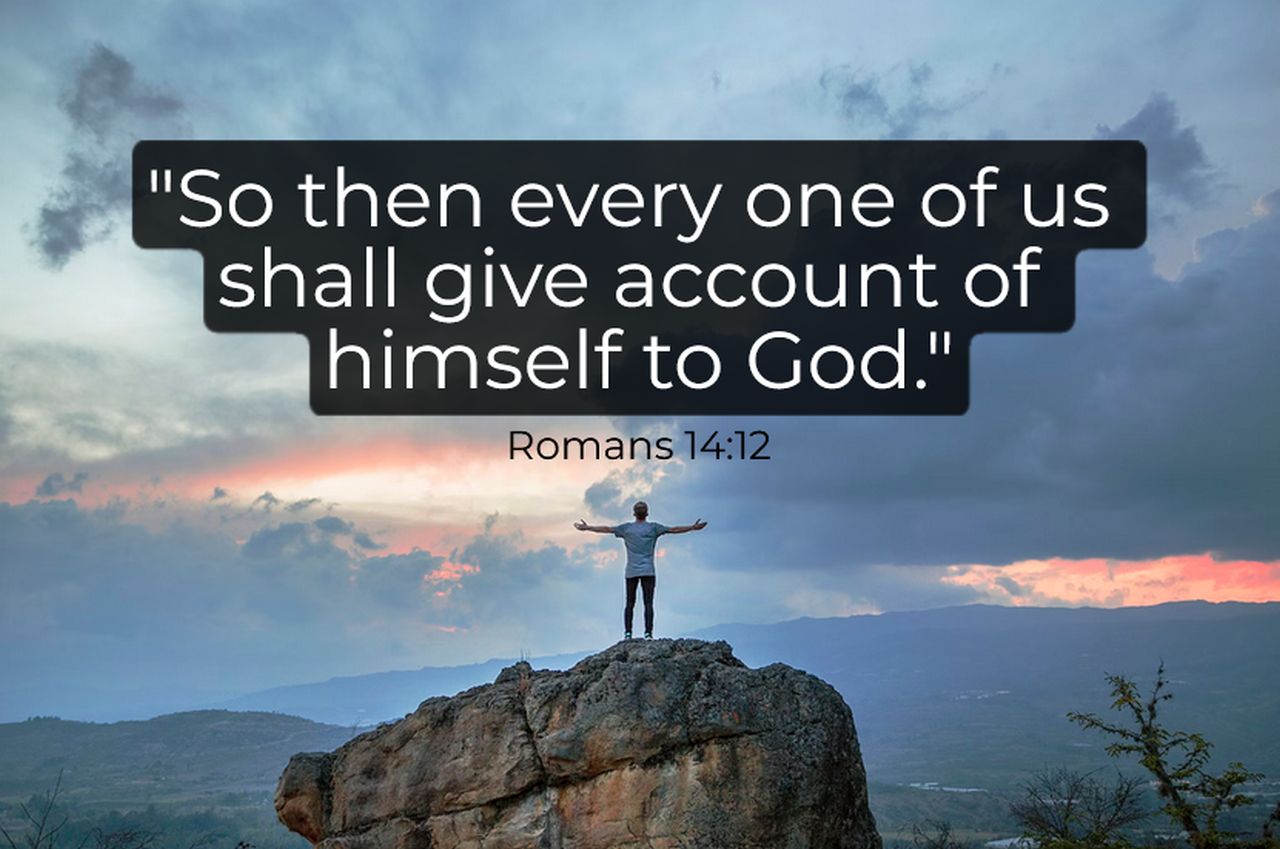
Articles
“Let Brotherly Love Continue” [podcast]

“Let Brotherly Love Continue.” Hebrews 13:1
“And walk in love, as Christ also hath loved us, and hath given himself for us an offering and a sacrifice to God for a sweetsmelling savour.” Ephesians 5:2
1 John 4
God Is Love
“7 Beloved, let us love one another: for love is of God; and every one that loveth is born of God, and knoweth God.
8 He that loveth not knoweth not God; for God is love.
9 In this was manifested the love of God toward us, because that God sent his only begotten Son into the world, that we might live through him.
10 Herein is love, not that we loved God, but that he loved us, and sent his Son to be the propitiation for our sins.
11 Beloved, if God so loved us, we ought also to love one another.
12 No man hath seen God at any time. If we love one another, God dwelleth in us, and his love is perfected in us.
13 Hereby know we that we dwell in him, and he in us, because he hath given us of his Spirit.
14 And we have seen and do testify that the Father sent the Son to be the Saviour of the world.
15 Whosoever shall confess that Jesus is the Son of God, God dwelleth in him, and he in God.
16 And we have known and believed the love that God hath to us. God is love; and he that dwelleth in love dwelleth in God, and God in him.
17 Herein is our love made perfect, that we may have boldness in the day of judgment: because as he is, so are we in this world.
18 There is no fear in love; but perfect love casteth out fear: because fear hath torment. He that feareth is not made perfect in love.
19 We love him, because he first loved us.
20 If a man say, I love God, and hateth his brother, he is a liar: for he that loveth not his brother whom he hath seen, how can he love God whom he hath not seen?
21 And this commandment have we from him, That he who loveth God love his brother also.”
1 Corinthians 13
“Though I speak with the tongues of men and of angels, and have not charity, I am become as sounding brass, or a tinkling cymbal. 2 And though I have the gift of prophecy, and understand all mysteries, and all knowledge; and though I have all faith, so that I could remove mountains, and have not charity, I am nothing. 3 And though I bestow all my goods to feed the poor, and though I give my body to be burned, and have not charity, it profiteth me nothing. 4 Charity suffereth long, and is kind; charity envieth not; charity vaunteth not itself, is not puffed up, 5 Doth not behave itself unseemly, seeketh not her own, is not easily provoked, thinketh no evil; 6 Rejoiceth not in iniquity, but rejoiceth in the truth; 7 Beareth all things, believeth all things, hopeth all things, endureth all things. 8 Charity never faileth: but whether there be prophecies, they shall fail; whether there be tongues, they shall cease; whether there be knowledge, it shall vanish away.”
Support | STORE | Podcasts | Jail/Prison Ministry | Mexico Mission here | All Ministry Updates | Because You Care Page | The Greatest of these is Charity | Be Ready in the Morning [podcast] | The Sure Mercies of David [podcast] | That Repentance and Remission of Sins should be Preached [podcast] | At His Feet | Prepared to be Used of God | Walking with Jesus on His Stated Terms – the Cross | Fasting and Prayer | The Old Man Must be Put Down [podcast] | The 5 Sins That Keep God’s People Out of Their Promised Land [podcast] | What Did Paul Mean by “I Keep Under My Body”? [podcast] | “Jesus the Author and Finisher of our Faith” [podcast] | A Living Sacrifice unto God [podcast] | Departing from Hell Beneath | Prayer

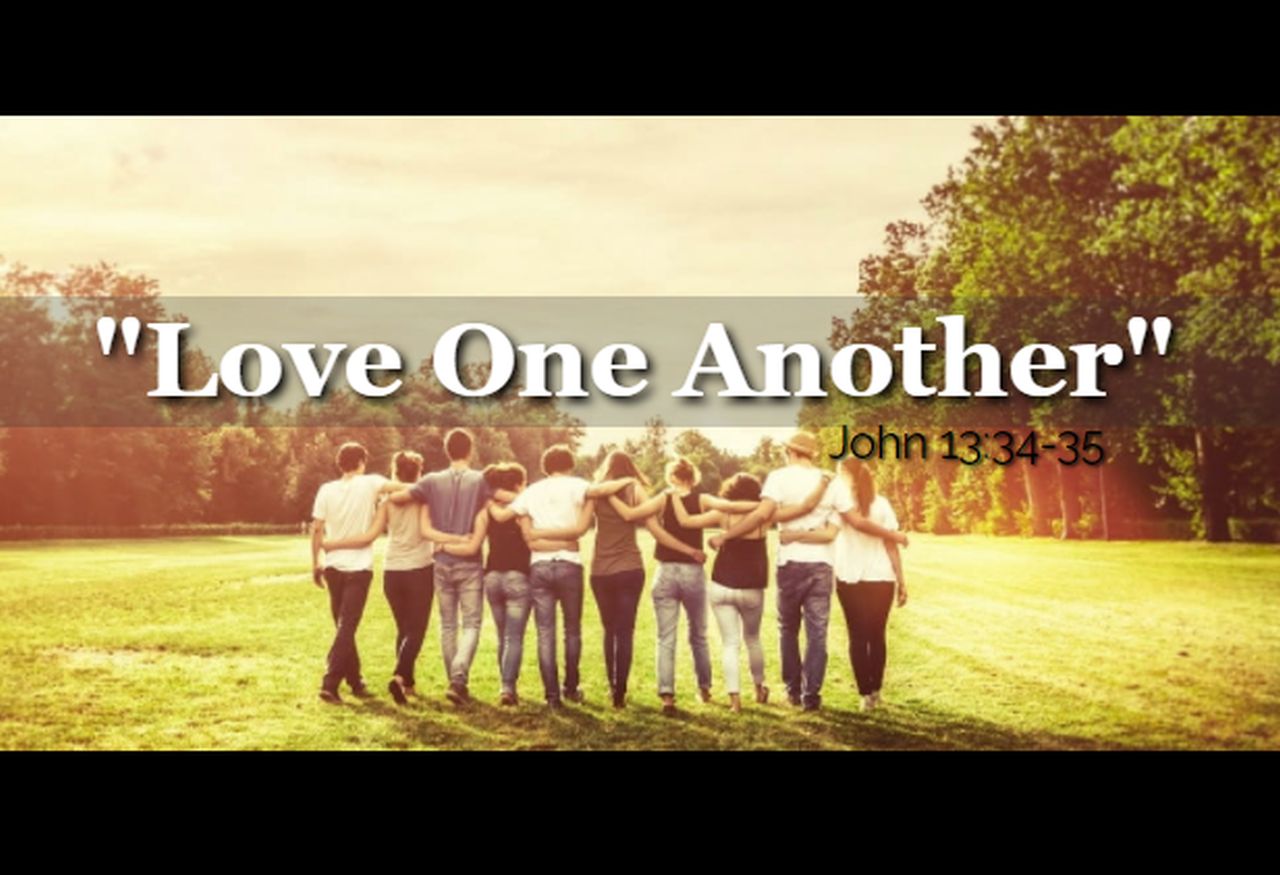

 America12 months ago
America12 months agoThe Drugging of America: The Pharmakeia Sorcery Deception [podcast]

 Articles2 years ago
Articles2 years agoChildren being Rescued in Tunnels: Happening Now – UPDATE!

 Articles8 years ago
Articles8 years agoSelf-Examination in Preparation for the Lord’s Return

 Apostasy2 years ago
Apostasy2 years agoSHOCKING List of False Prophets Most Believe are True










